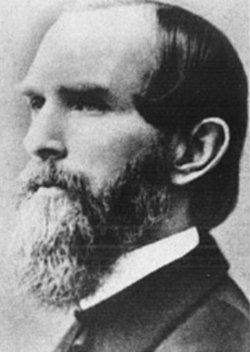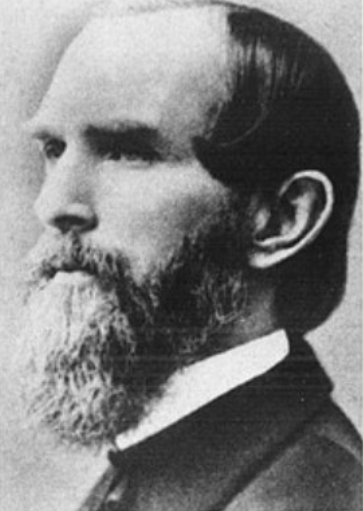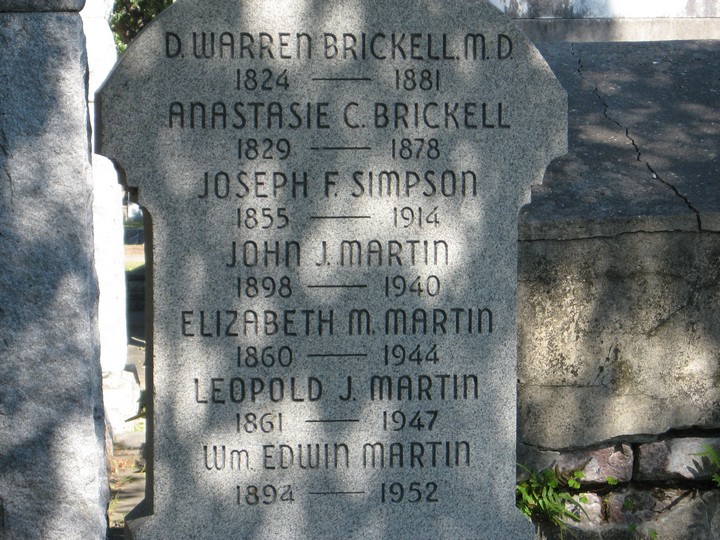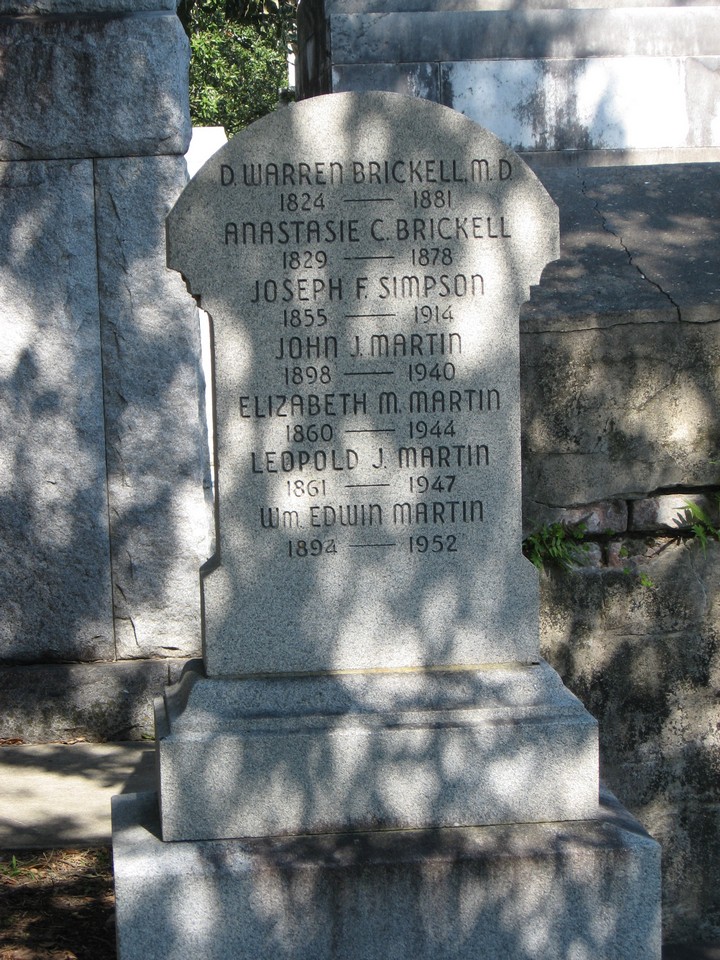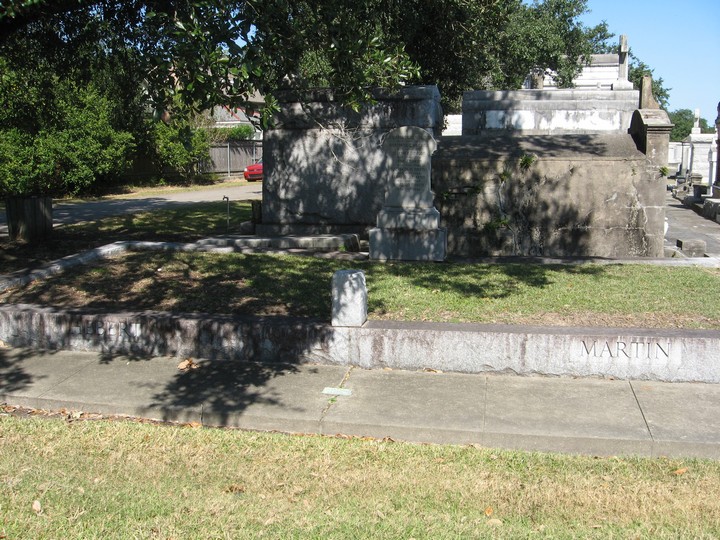"He was emphatically a man of truth, and consequently a true man. He was the farthest possible removed from a trimmer, or a time server; he had strong convictions, and possessed the requisite courage to carry them into practice. In determining his course on any question, no such miserable interrogations as, Will it pay? Will it be popular? or, Will it contribute to self-aggrandizement? ever suggested themselves to his mind; but always and everywhere, simply and only, Is it true? Is it right? and with these affirmatively answered, his course was never a matter of doubt, or of uncertainty."
************
"Born at Columbia, on Saturday, the 9th Oct. 1824, at three quarters past 6 o'clock, in the evening, Daniel Warren, second son of Wm. A. and Susan M. Brickell [William Augustus Brickell and Susan Margaret Faust]. We named him in compliment to his grandfather, Mr. Daniel Faust, and my old friend, Col. Samuel Warren."
From "St. Louis courier of medicine"
"Died, in New Orleans, Dec. 10th, 1881, in the 58th year of his age, Daniel Warren Brickell, M.D., long a distinguished physician, and a leading citizen of that city--and a corresponding member of this society.
"The St. Louis Obstetrical and Gynecological Society--to many of whose members the deceased was personally known--desire to record their estimate of the character and labors, and to express their deep regret at the death of one so justly eminent in the profession.
"Dr. Brickell was born in Columbia, South Carolina, on the 9th day of Oct., 1824, his ancestors having been among the earliest settlers of that state. Losing his mother at a very early age, he was reared by his paternal grandmother, who seems to have been a woman of unusual strength and integrity of character, as is shown by the wonderful influence she exerted in moulding the habits and destiny of her youthful charge.
"Having completed his preliminary education, he matriculated as a student of medicine in the medical department of the University of Pennsylvania in the winter of 1845, selecting as his private preceptor the late Dr. Wm. Gerhard of Philadelphia, to whom he was ever warmly attached. In the spring of 1847 he received the degree of Doctor of Medicine. After graduating, however, he entered upon a course of special study, with the view of applying for admission to the U. S. navy, and in the winter of the same year appeared before the examining board of naval surgeons, and out of forty applicants he passed second on the list. His object in seeking the naval service was mainly to gratify his desire for foreign travel. But as there was then only one vacancy in the foreign service, he was assigned to home duty, which proved so distasteful to him that he soon resigned his commission as assistant surgeon in the navy, and at once removed to New Orleans, where, in 1848, he commenced the practice of medicine. As might have been expected, he soon made his mark in that metropolis of the southwest, and henceforward to the day of his death his name was identified with the medical and civil history of that city.
"There is so much sameness in the daily life, and in the daily conflict of the physician, that the history of one is usually the history of the many; it is needless, therefore, to go into any lengthy detail in tracing the career of Dr. Brickell. Let it suffice to say, that as a general practitioner of medicine, as physician and surgeon, and clinical lecturer in the Charity Hospital; as clinical teacher of the diseases of women and children; as professor of obstetrics in the New Orleans School of Medicine, one of the founders of which he was, as associate editor of the New Orleans Medical News and Hospital Gazette, and editor in chief of the Southern Journal of Medicine, and especially as an able writer on, and a skillful and judicious practitioner in, the treatment of yellow fever, he stood out prominent, and in all these regards acquitted himself handsomely.
"During the late Civil War, when New Orleans was in a state of siege, he was chosen by his fellow citizens one of the committee of safety charged with the defense of the city. But when, in the spring of 1862, it could no longer be defended, and had to be surrendered, he at once joined the Confederacy, which he continued to serve faithfully, and with all the energy of his nature, up to the close of the war. When peace was declared, he returned to New Orleans with shattered fortune, and disappointed hopes, to resume his life-work anew. Just then, without any solicitation on his part, he was elected to the chair of Obstetrics in the Bellevue Hospital College, N. Y., which position, at the earnest solicitation of his friends, he accepted, and during the following winter delivered a course of lectures in that institution, to the entire satisfaction of both faculty and students; but when the spring came--from considerations purely personal--he resigned the honors of the Bellevue professorship and returned to New Orleans to spend the remainder of his life, already imperiled by disease, in serving, to the utmost of his ability, the institutions and the people of the city he loved so well.
"As an obstetrician, Dr. Brickell possessed remarkable skill and dexterity, while as a gynecologist he was at once a pioneer and an acknowledged master. His friend and colleague, Dr. J. Dickson Bruns--to whom acknowledgment is made for many of the facts here mentioned--says of him: 'He was a wise, cautious and conservative physician. Thoroughly grounded in the principles of his science, his practice was equally removed from the rashness of the empiric and the timidity of skepticism. As a surgeon, he was bold, dexterous and self-reliant. He operated successfully for ovarian tumors, performed Cesarean section brilliantly, and with the best results, in one case beyond all reasonable hope, and in plastic operations for uterine and vaginal lesions counted numberless triumphs.'
"Here let his claim to professional distinction rest, though much more might be said, that we may view him for a moment, in closing, as a man and a citizen.
"The leading traits of Dr. Brickell's character were unswerving integrity, transparent truthfulness, and heroic courage. From early childhood he seems to have had instilled into his mind the great and important lesson that truthfulness is the foundation of all that is admirable in character, and throughout life he exemplified this exalted trait in his whole career as a man, a physician and a citizen. He was emphatically a man of truth, and consequently a true man. He was the farthest possible removed from a trimmer, or a time server; he had strong convictions, and possessed the requisite courage to carry them into practice. In determining his course on any question, no such miserable interrogations as, Will it pay? Will it be popular? or, Will it contribute to self-aggrandizement? ever suggested themselves to his mind; but always, and everywhere, simply and only, Is it true? Is it right? and with these affirmatively answered, his course was never a matter of doubt, or of uncertainty. Such men are not always popular, but then mere popularity is not what such men are striving for. Their aims are far higher and nobler, and in their manly pursuit of them they are as sure to attract to themselves the wise and the good, as the magnet is to gather up the real metal from the mass of surrounding rubbish. Such an one was the subject of this brief notice--Dr. Daniel Warren Brickell.
**********
Daniel Warren Brickell was born in Columbia, South Carolina, on October 9, 1824. After the death of his mother in 1828, Brickell was reared by his paternal grandmother in Winnsboro, South Carolina, where he studied at Mr. Hudson's Academy. The family moved to Franklin, Tennessee, in 1833. After four years there, they migrated to the fertile farmlands of the Mississippi Delta.
In 1844, Brickell travelled to New Haven, Connecticut, to complete preparatory studies necessary for matriculation at Yale University. Instead of entering Yale in 1845 as planned, however, Brickell became a student of Dr. William Gerhard of the Medical Department of the University of Pennsylvania, receiving the MD degree in 1847. After a brief stint in the Navy, he began the practice of medicine in New Orleans in 1848. Shortly after opening his New Orleans practice, Brickell married Susan Conner, of Natchez; he moved to his wife's home, where he continued to practice while managing a plantation on the Yazoo River [Berkeley Plantation, Adams County, Mississippi]. Upon the death of his wife in 1857, he returned to New Orleans, where he died in December 1881. [He married a second time June 25, 1858, to Anastasie Catherine Welham].
Brickell served as a clinical lecturer at Charity Hospital; as Professor of Obstetrics at the New Orleans School of Medicine, of which he was one of the founders; as Associate Editor of the New Orleans Medical News and Gazette; and as Editor of the Southern Journal of Medicine. In 1873, Brickell accepted the Chair of Obstetrics at the Bellevue Hospital College, but returned to New Orleans for personal reasons after one winter in New York.
http://journals.lww.com/smajournalonline/Citation/1988/06000/Brickell_VS_CartWright__Con frontations_in_the.20.aspx
"He was emphatically a man of truth, and consequently a true man. He was the farthest possible removed from a trimmer, or a time server; he had strong convictions, and possessed the requisite courage to carry them into practice. In determining his course on any question, no such miserable interrogations as, Will it pay? Will it be popular? or, Will it contribute to self-aggrandizement? ever suggested themselves to his mind; but always and everywhere, simply and only, Is it true? Is it right? and with these affirmatively answered, his course was never a matter of doubt, or of uncertainty."
************
"Born at Columbia, on Saturday, the 9th Oct. 1824, at three quarters past 6 o'clock, in the evening, Daniel Warren, second son of Wm. A. and Susan M. Brickell [William Augustus Brickell and Susan Margaret Faust]. We named him in compliment to his grandfather, Mr. Daniel Faust, and my old friend, Col. Samuel Warren."
From "St. Louis courier of medicine"
"Died, in New Orleans, Dec. 10th, 1881, in the 58th year of his age, Daniel Warren Brickell, M.D., long a distinguished physician, and a leading citizen of that city--and a corresponding member of this society.
"The St. Louis Obstetrical and Gynecological Society--to many of whose members the deceased was personally known--desire to record their estimate of the character and labors, and to express their deep regret at the death of one so justly eminent in the profession.
"Dr. Brickell was born in Columbia, South Carolina, on the 9th day of Oct., 1824, his ancestors having been among the earliest settlers of that state. Losing his mother at a very early age, he was reared by his paternal grandmother, who seems to have been a woman of unusual strength and integrity of character, as is shown by the wonderful influence she exerted in moulding the habits and destiny of her youthful charge.
"Having completed his preliminary education, he matriculated as a student of medicine in the medical department of the University of Pennsylvania in the winter of 1845, selecting as his private preceptor the late Dr. Wm. Gerhard of Philadelphia, to whom he was ever warmly attached. In the spring of 1847 he received the degree of Doctor of Medicine. After graduating, however, he entered upon a course of special study, with the view of applying for admission to the U. S. navy, and in the winter of the same year appeared before the examining board of naval surgeons, and out of forty applicants he passed second on the list. His object in seeking the naval service was mainly to gratify his desire for foreign travel. But as there was then only one vacancy in the foreign service, he was assigned to home duty, which proved so distasteful to him that he soon resigned his commission as assistant surgeon in the navy, and at once removed to New Orleans, where, in 1848, he commenced the practice of medicine. As might have been expected, he soon made his mark in that metropolis of the southwest, and henceforward to the day of his death his name was identified with the medical and civil history of that city.
"There is so much sameness in the daily life, and in the daily conflict of the physician, that the history of one is usually the history of the many; it is needless, therefore, to go into any lengthy detail in tracing the career of Dr. Brickell. Let it suffice to say, that as a general practitioner of medicine, as physician and surgeon, and clinical lecturer in the Charity Hospital; as clinical teacher of the diseases of women and children; as professor of obstetrics in the New Orleans School of Medicine, one of the founders of which he was, as associate editor of the New Orleans Medical News and Hospital Gazette, and editor in chief of the Southern Journal of Medicine, and especially as an able writer on, and a skillful and judicious practitioner in, the treatment of yellow fever, he stood out prominent, and in all these regards acquitted himself handsomely.
"During the late Civil War, when New Orleans was in a state of siege, he was chosen by his fellow citizens one of the committee of safety charged with the defense of the city. But when, in the spring of 1862, it could no longer be defended, and had to be surrendered, he at once joined the Confederacy, which he continued to serve faithfully, and with all the energy of his nature, up to the close of the war. When peace was declared, he returned to New Orleans with shattered fortune, and disappointed hopes, to resume his life-work anew. Just then, without any solicitation on his part, he was elected to the chair of Obstetrics in the Bellevue Hospital College, N. Y., which position, at the earnest solicitation of his friends, he accepted, and during the following winter delivered a course of lectures in that institution, to the entire satisfaction of both faculty and students; but when the spring came--from considerations purely personal--he resigned the honors of the Bellevue professorship and returned to New Orleans to spend the remainder of his life, already imperiled by disease, in serving, to the utmost of his ability, the institutions and the people of the city he loved so well.
"As an obstetrician, Dr. Brickell possessed remarkable skill and dexterity, while as a gynecologist he was at once a pioneer and an acknowledged master. His friend and colleague, Dr. J. Dickson Bruns--to whom acknowledgment is made for many of the facts here mentioned--says of him: 'He was a wise, cautious and conservative physician. Thoroughly grounded in the principles of his science, his practice was equally removed from the rashness of the empiric and the timidity of skepticism. As a surgeon, he was bold, dexterous and self-reliant. He operated successfully for ovarian tumors, performed Cesarean section brilliantly, and with the best results, in one case beyond all reasonable hope, and in plastic operations for uterine and vaginal lesions counted numberless triumphs.'
"Here let his claim to professional distinction rest, though much more might be said, that we may view him for a moment, in closing, as a man and a citizen.
"The leading traits of Dr. Brickell's character were unswerving integrity, transparent truthfulness, and heroic courage. From early childhood he seems to have had instilled into his mind the great and important lesson that truthfulness is the foundation of all that is admirable in character, and throughout life he exemplified this exalted trait in his whole career as a man, a physician and a citizen. He was emphatically a man of truth, and consequently a true man. He was the farthest possible removed from a trimmer, or a time server; he had strong convictions, and possessed the requisite courage to carry them into practice. In determining his course on any question, no such miserable interrogations as, Will it pay? Will it be popular? or, Will it contribute to self-aggrandizement? ever suggested themselves to his mind; but always, and everywhere, simply and only, Is it true? Is it right? and with these affirmatively answered, his course was never a matter of doubt, or of uncertainty. Such men are not always popular, but then mere popularity is not what such men are striving for. Their aims are far higher and nobler, and in their manly pursuit of them they are as sure to attract to themselves the wise and the good, as the magnet is to gather up the real metal from the mass of surrounding rubbish. Such an one was the subject of this brief notice--Dr. Daniel Warren Brickell.
**********
Daniel Warren Brickell was born in Columbia, South Carolina, on October 9, 1824. After the death of his mother in 1828, Brickell was reared by his paternal grandmother in Winnsboro, South Carolina, where he studied at Mr. Hudson's Academy. The family moved to Franklin, Tennessee, in 1833. After four years there, they migrated to the fertile farmlands of the Mississippi Delta.
In 1844, Brickell travelled to New Haven, Connecticut, to complete preparatory studies necessary for matriculation at Yale University. Instead of entering Yale in 1845 as planned, however, Brickell became a student of Dr. William Gerhard of the Medical Department of the University of Pennsylvania, receiving the MD degree in 1847. After a brief stint in the Navy, he began the practice of medicine in New Orleans in 1848. Shortly after opening his New Orleans practice, Brickell married Susan Conner, of Natchez; he moved to his wife's home, where he continued to practice while managing a plantation on the Yazoo River [Berkeley Plantation, Adams County, Mississippi]. Upon the death of his wife in 1857, he returned to New Orleans, where he died in December 1881. [He married a second time June 25, 1858, to Anastasie Catherine Welham].
Brickell served as a clinical lecturer at Charity Hospital; as Professor of Obstetrics at the New Orleans School of Medicine, of which he was one of the founders; as Associate Editor of the New Orleans Medical News and Gazette; and as Editor of the Southern Journal of Medicine. In 1873, Brickell accepted the Chair of Obstetrics at the Bellevue Hospital College, but returned to New Orleans for personal reasons after one winter in New York.
http://journals.lww.com/smajournalonline/Citation/1988/06000/Brickell_VS_CartWright__Con frontations_in_the.20.aspx
Family Members
Advertisement
Explore more
Sponsored by Ancestry
Advertisement
